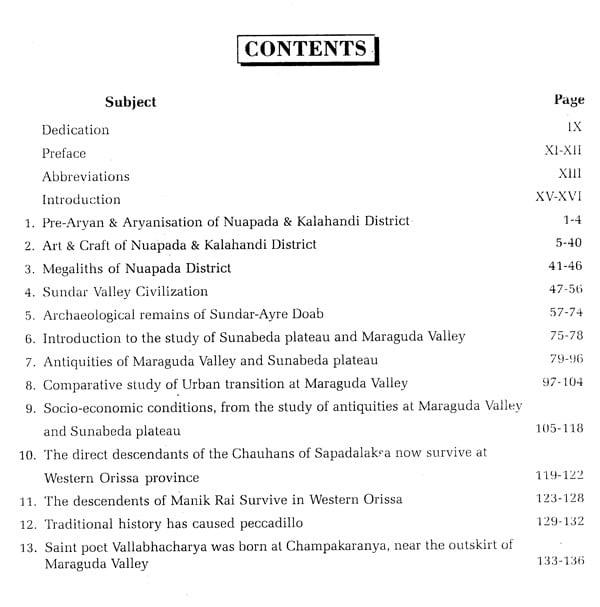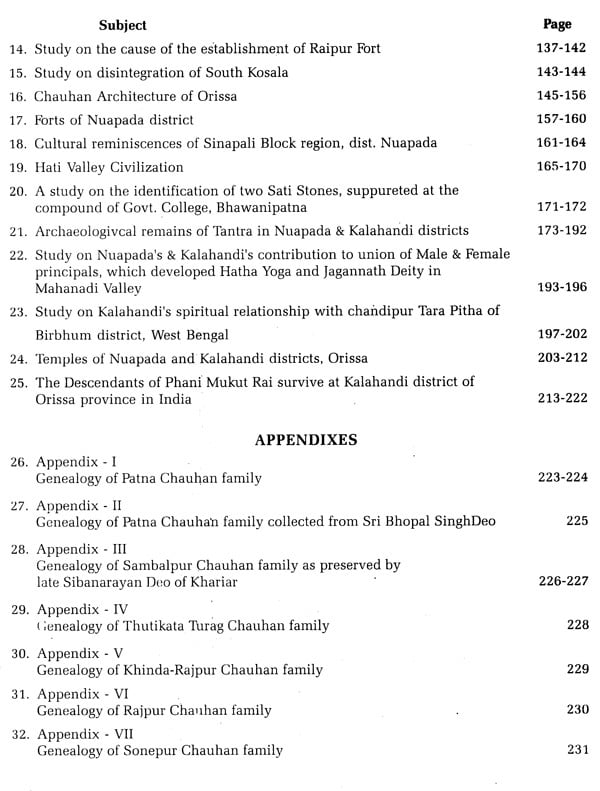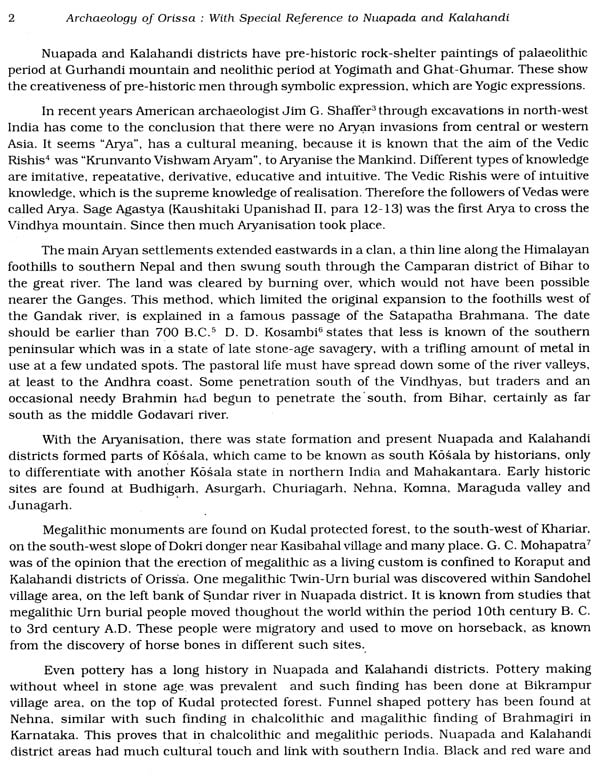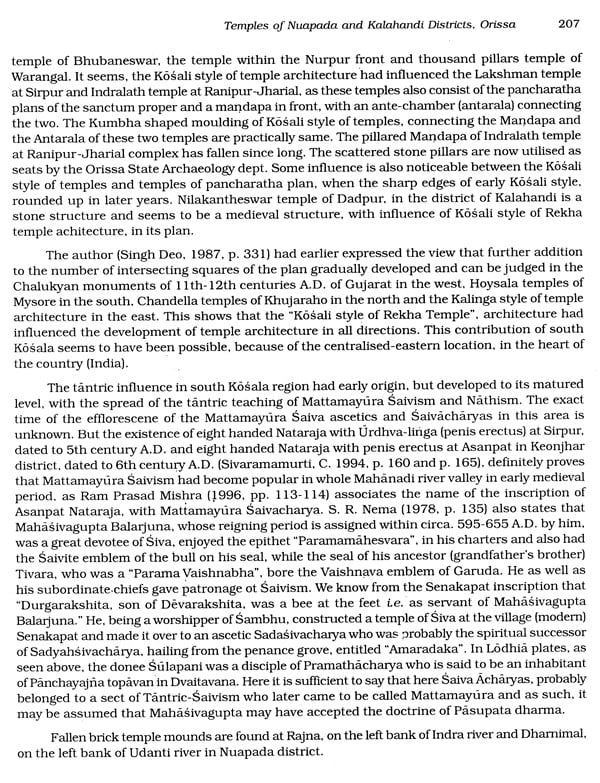About the Book The Nuapada and Kalahandi districts of Orissa province are rich in archaeo logical remains. Systematic surveys and required excavations are not yet done. From the archaeological works so far, in individual level of the author, the antediluvian, pre-history, proto-history. early history and medieval history, till the Rise of Chauhan and Naga dynasties have been done. The study shows the path for such works to be taken up in all districts of all the Provinces of India, i.e. Bharatavarsha.
About the Author Jitamitra Prasad Singh Deo (born 29th August 1946) is an individual field Archaeological Researcher at Khariar. He was spiritually Initiated in 1971. He is credited with the discovery of pre historic Rock art of Yogimath Donger. Ghat Ghumar rock art, Copper plates, Gold coins of Sarabhapuriya dynasty. Clay Seal. Stone Seal of Pänduvamst dynasty, Kalachuri Coins. Terracottas, Beads and Sculptures of many types. With the presentation of his findings, KHARIAR BRANCH MUSEUM, was opened by Govt. of Orissa in 1976. His few archaeological findings are presented to "Dr. N. K. SAHU MUSEUM," of Sambalpur University and Orissa State Museum. With his effort, "MANIKYAPUR MUSEUM," was started by Govt. of Orissa in 1994, at Bhawanipatna. He is Life Member of Institute of Historical Studies, Kolkata. Orissa History Congress, Red-Cross Society and Utkal Sahitya Samaj. President Khariar Sahitya Samity which has celebrated its Centenary in 1983 and Archaeological Committee, Khariar. Author of Research Books and has contributed to different Research Journals, Bulletins. Periodicals, Magazines and Papers. He was facilitated by 'EKAMRA SAMMAN,' in 2002 A.D.
Preface While writing the history of India, Historians are following the historical political chronological era alias period, as established by foreign English Historians so far as the study of ancient history chronology in concerned. "The Politics of History", is not understood. Oon of tho principal finding of recent research is that the whole of the ancient Indian Civilization from the remotest antiquity to the ending of the Harappans in the 2200-1000 BC. span was a continum After Independence of India, the Scholars of India, for the first time compiled their own history named "The History and Culture of the Indian People", under the general editorship of R C. Majumdar. published by Bharatiya Vidya Bhavan, Mumbal, in eleven volumes. The Chronological dating of the early period of the History of India, in these series was not free the pressure and acceptence of the British Yoko Indian elite in general and the Scholars in particular are so much under the influence of the writings of Western Scholars, that any fresh and independent conclusion about Indian history becomes jarring to them if it goes beyond the ambit of Western writings. Very few Indian Scholars have shown courage to deviate from the general guidelines of Indian history provided by their Western counterparts. The Isolated efforts of these Indian Scholars concern only one or the other aspect of Indian history. But, in general it has been proved beyond an lots of doubt that facts in our history have been twisted, mischieveous interpretations have been put on them and wrong conclusions have been drawn by most of the Western writings to suit their individual motive or whim. Under the general editorship of S. D. Kulkarni, eighteen volumes of "Bhishma's Study of Indian History and Culturo", have been published in recent years. It is perhaps the first comprehensive attempt to present a matter of fact. History of India, based on original sources Inlcuding the Vedas, the Puranas, the Epics and the mass of secular literatures in Sanskrit and other Indian languages. While interpreting facts, due cognizance of ancient Indian traditions has been taken. In so doing the modern research methodology has been followed and each issue has been critically examined from all possible ongles.
Introduction The two districts of Nuapada and Kalahandi are situated at the extreme South-Western border of Orissa provitice in India, between 10 30 N. and 21.5 N. letitudes and 82 20 E. and 830.47 E longes Nuapada district area comprises the territory of Khariar States which was redased to an Estate by Britis Governmet in 1865 A.D. Khariar Le modern Nuapada district) formed a part of the Chota Nagpur Division in British Record, until it was transferred to the jurisdiction of the Superintendent of Tributary Mahals Cuttack, in 1861 and in 1862 they said State was transferred as a part of Sambalpur and be cue incorporated in the Central Provinces of British India Khariar Fatate was transfered in newly formed Orissa Province on 1st April 1936 Khariar Estate area formed the Nuapada Sub-divison and formed a part of Sambalpur district since 1936.
Kalahandi State merged with Orissa on the 1st January 1948 The ex-State after integration together with the ex-States of Patna and Sonepur formed the district of Kalahandi with headquarter at Balangit On 1st November 1949. Patna and Sonepur ex-State areas were separated to form the district of Balangirpatns (later Balangir) and the ex-State of Kalahandi, together with the Nuapada sub-division which formed a part of Sambalpur district, since 1st Aprial 1938, was reconstituted a separate district (Kalahandi) with headquarters at Bhawanipatna Govt. of Orissa again resuffled and created 30 districts in Orissa province and Nuapada district was created on 1st April 1993. Padmasri Paramananda Acharya' states, "Yuan Chwang has described a place called Polomolokili, which is Parimalagiri. The location of this place is somewhere in Western Orissa. There is a vast Archaeological site in the Khariar sub-division of the Kalahandi district, not yet visited by any Archaeologist. Sri Durga Prased Tripathi, an O.AS (later LA.S.) Officer described it in the proposed Gazetteer of Khariar. This proposed Gazetteer of Khariar was never published and this Manuscript is now preserved at the Archives of the History Department of Sambalpur University. Accession No. 44.
Belkhandi site in Kalahandi State region was visited by 1. D. Beglar in 1874-75 and 1875-76, who gave a detailed note on its ruin in "Archaeological Suvey of India Report. Vol XIII In 1946, the Kalahandi Durbar administration undertook excavation at this site, which brought to light the lower part of a temple consecreated to Goddess Chandi and the beautiful images of Saptamatraka (Seven mother Goddesses). In the words of Maharaja Pratap Keshari Deo An archaeological department was established in the State under Sri Kedarnath Mohapatra and Sri Satyanarayan Rajguru who took up various researches and excavation work of temples like Belkhandi temple and the site of Sapta Matrukas along the Tel Valley. As I happened to be the President of the Kalinga Historical Society, a quarterly high-class Journal known as The Kalinga Historical Journal' was rublished from Bhawanipatna Sri Purnachandra Rath of the Archaeological Department of the adjoining Patna State happened to be the Secretary and Senior Editor of the Journal. Orissa did not have an Archaeology Department at that time. The nucleus of the Orissa Archaeology Department was started by Sri Satyanarayan Rajguru and Sri Kedarnath Mohapatra, employees of the erstwhile Kalahandi State and Sri Paramananda Acharya of Mayurbhanj State Service. This department is a gift to Orissa and has organised the Museum in Bhubaneswar. N. K. Sahu, P. K. Mishra and J. K. Sahu also state that The Kalinga Historical Research "ournal brought to light a band of local Scholars like Purna Chandra Rath.
**Contents and Sample Pages**






























